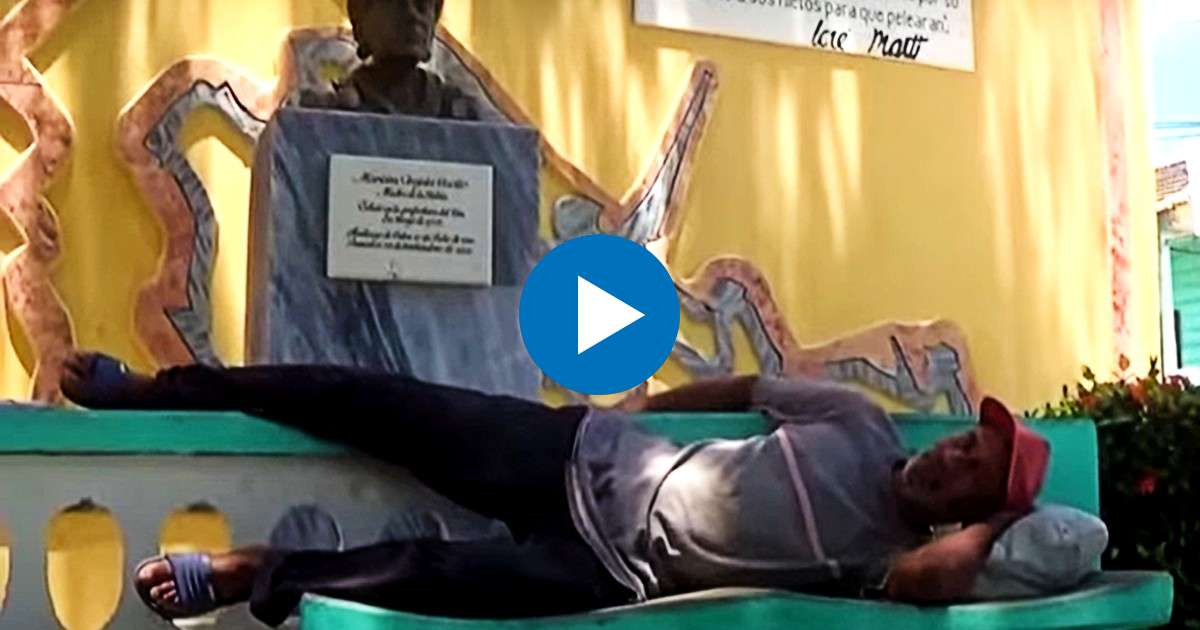
Enio Ángel Vega Catá, a Cuban citizen who belonged to theRevolutionary Armed Forces (FAR), currently lives as a beggar, homeless, and abandoned by social services and the Cuban authorities.
“Right now I am helpless. I have nowhere to live, or anything at all. I was an officer in the Armed Forces for 14 years. I reached the rank of Captain. I studied in the 'camilitos', at the La Cabaña Cadet School. I graduated there as a Medium Technician in Tactical Command,” Vega Catá explained to the independent media.CubaNet.
The former military man, who trained officers and soldiers who were sent by the regime to the war in Angola in general tactics, now survives on the streets of Baracoa and is looking for some money as a “colero.”
With what he gets, he can afford only one meal a day, in the afternoon. “To feed myself I fight for a little money in the queues that I stand in. I stick with that. I eat only one meal a day to sustain myself, the one in the afternoon,” he explained to the aforementioned media.
“I am a carpenter, bricklayer, plumber and electrician, and I am not working. I have gone to several companies and they tell me that there are no positions, that they are reducing staff,” confessed this Cuban who feels abandoned by the authorities of a country in the service of whose army he was working for more than a decade.
Vega Catá's home was destroyed by Hurricane Matthew in 2016. Although they promised him help to rebuild it, the truth is that it was located on land belonging to a cooperative that recovered the land, leaving the former military man without a home.
The man's lack of resources, added to the alcoholism he suffers from, ended up turning him into a “homeless man” who lives poorly in parks and doorways, where he “takes refuge” at night, especially.
“In the FAR I began my main season of alcoholism. I became company head. One stuck in that intricate mountain, what was he doing? "Smoking and giving yourself some 'sticks' to alleviate the pain," he acknowledged.
His few belongings (underwear, a T-shirt, a coat, his water bowl and his ration book) fit in a bag that he always carries with him. Today he seeks life as a 'colero', despite mastering several trades.
“My specialty is General Tactics and I have worked in the Baracoa General Staff,” he revealed to the Cuban Observatory of Human Rights in an interview published on social networks at the end of August.
Now, according toCubaNet, his greatest concern is that the regime will retaliate against his son, apparently a “cadre” in the ranks of the Union of Young Communists (UJC), for statements made to NGOs and independent media.
In mid-August, a man “homeless” in the city of HolguínHe asked for help eating because he couldn't work because he had a bad foot..
One photo showed the man, sitting on the floor, holding a sign asking for help: “While in prison, my family sold my house to leave the country and, luckily, I have a bad foot and I can't work. Help me with whatever you have and can. I do this to eat. God bless you. I live in the street. Thank you".
In February the news broke thatThe province of Matanzas did not have a center to house and help homeless people who spend the night on the streets., many of them, elderly people, without family or abandoned by them.
Published in the official newspaperGiron, the report recognized that government organizations and institutions are not prepared to take care of these people and blamed the families for the situation of helplessness they suffer, living on the streets and in conditions of extreme poverty.
In August 2019, a report published by the siteCubadebate He indicated that around 30 people were picked up daily on the streets and some entered the Havana Social Protection Center every day of the month, designed to receive those people in situations of social vulnerability because they do not work or have housing problems. poor family relationships and/or a deteriorated mental health status.
The Cuban authorities themselvesThey then recognized that there was no mechanism permanent for the admission, diagnosis, care and social reintegration of people with wandering behavior in Havana. If this happens in the capital, it is to be imagined that the situation will be even more critical and precarious in the “primary city of Cuba.”
What do you think?
SEE COMMENTS (9)Filed in: